AMD Zen 4 Ryzen 9 7950X and Ryzen 5 7600X Review: Retaking The High-End
by Ryan Smith & Gavin Bonshor on September 26, 2022 9:00 AM ESTCPU Benchmark Performance: Simulation And Encoding
Simulation and Science have a lot of overlap in the benchmarking world, however for this distinction we’re separating into two segments mostly based on the utility of the resulting data. The benchmarks that fall under Science have a distinct use for the data they output – in our Simulation section, these act more like synthetics but at some level are still trying to simulate a given environment.
One of the interesting elements on modern processors is encoding performance. This covers two main areas: encryption/decryption for secure data transfer, and video transcoding from one video format to another.
In the encrypt/decrypt scenario, how data is transferred and by what mechanism is pertinent to on-the-fly encryption of sensitive data - a process by which more modern devices are leaning to for software security.
Video transcoding as a tool to adjust the quality, file size and resolution of a video file has boomed in recent years, such as providing the optimum video for devices before consumption, or for game streamers who are wanting to upload the output from their video camera in real-time. As we move into live 3D video, this task will only get more strenuous, and it turns out that the performance of certain algorithms is a function of the input/output of the content.
We are using DDR5 memory on the Ryzen 9 7950X and Ryzen 5 7600X, as well as Intel's 12th Gen (Alder Lake) processors at the following settings:
- DDR5-5200 CL44 - Ryzen 7000
- DDR5-4800 (B) CL40 - Intel 12th Gen
All other CPUs such as Ryzen 5000 and 3000 were tested at the relevant JEDEC settings as per the processor's individual memory support with DDR4.
Simulation
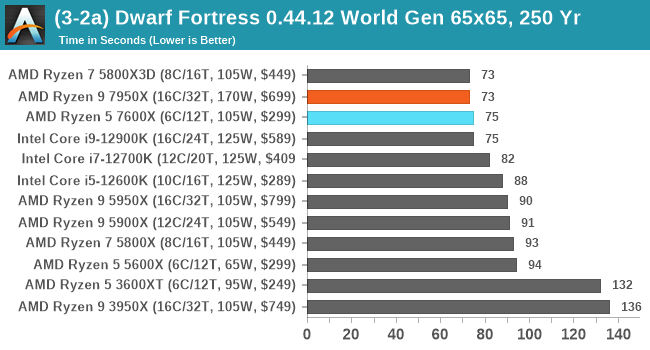
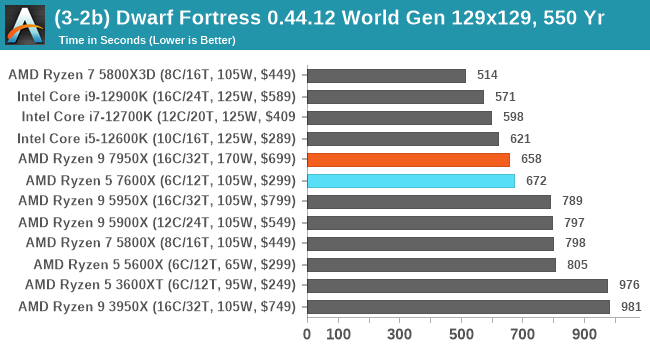
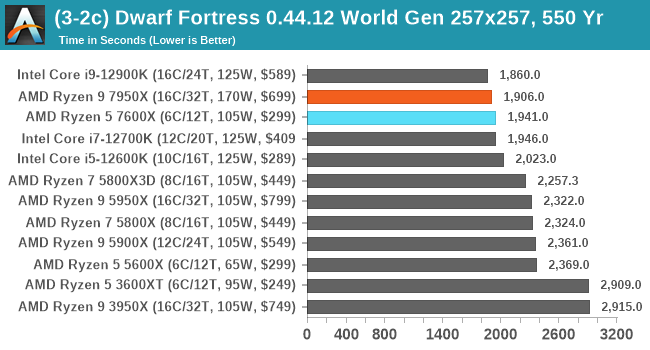
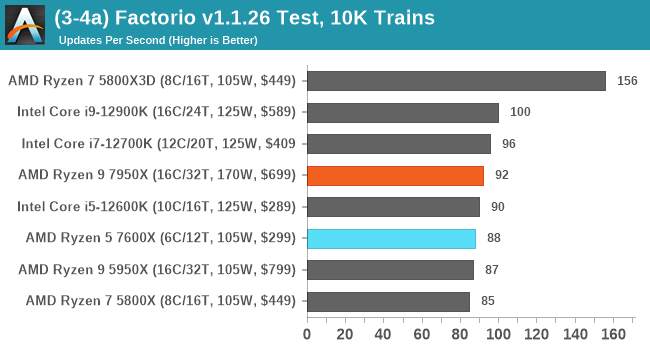
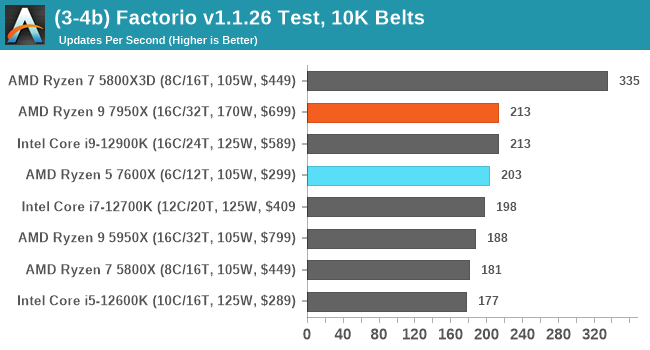
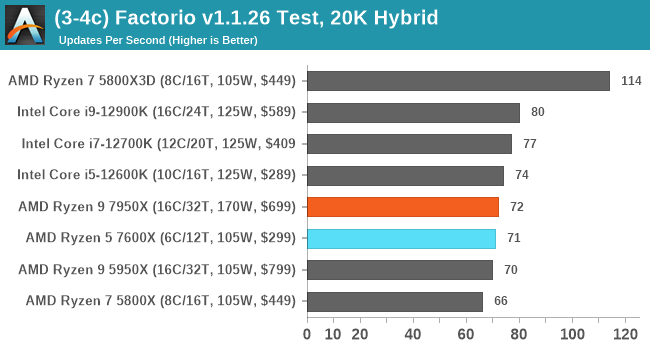
Starting with the Dwarf Fortress section of our simulation suite, the performance of the Ryzen 9 7950X and Ryzen 5 7600X is inconsistent, to say the least. In the smaller of our three Dwart Fortress tests, there's around 2-3% difference between the Ryzen 7000 chips, the Core i9-12900K and Core i7-12700K, and AMD's impressive Ryzen 7 5800X3D with its incredibly large 96 MB pool of cache to play with.
In the larger Dwarf Fortress workloads, and the Alder Lake based Core i9-12900K, the Core i7-12700K and the Core i5-12600K show better scope for performance, with the exception being the Ryzen 7 5800X3D which due to its large 3D V-Cache, keeps the pressure on Intel.
Looking at performance in our Factorio benchmarks, the AMD Ryzen 7 5800X3D with its 3D V-Cache is streets ahead of the competition, with both the Ryzen 9 7950X and Ryzen 5 7600X both lagging behind considerably. Comparing Ryzen 7000 to Intel's Alder Lake, Alder Lake has the overall advantage here, even with the many optimizations and improvements that Zen 4 brings to the table.
Encoding
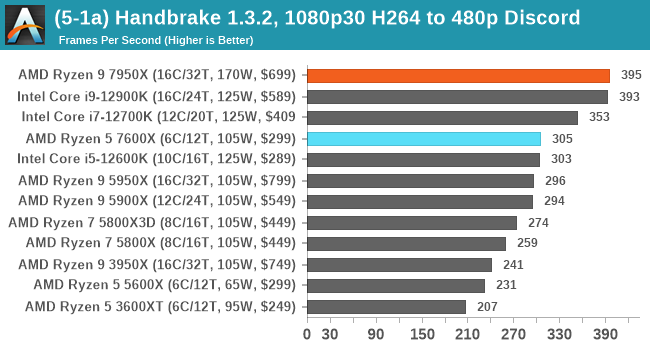
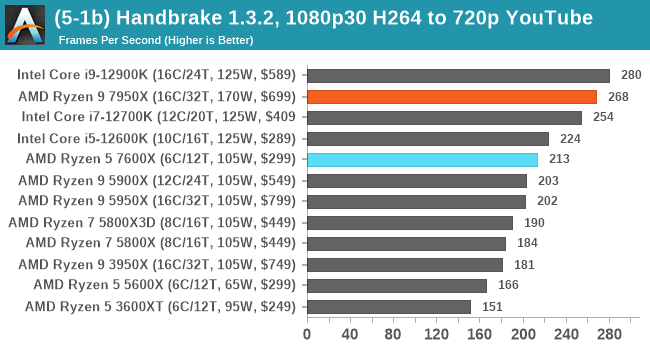
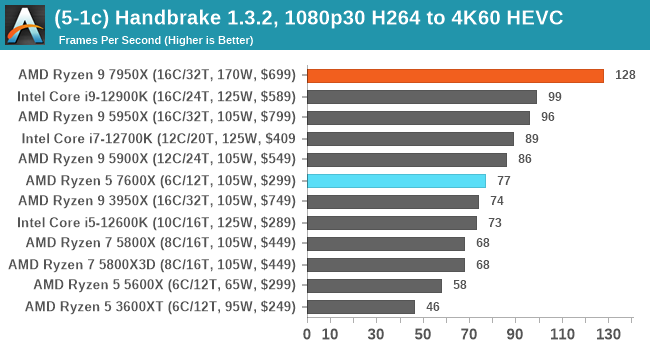
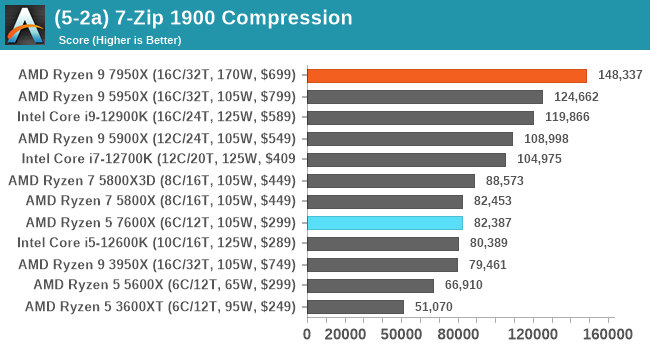
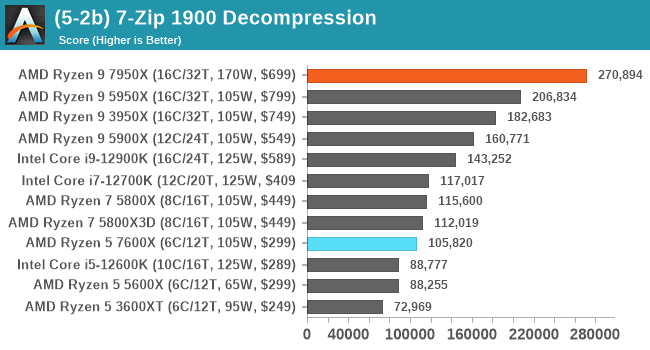
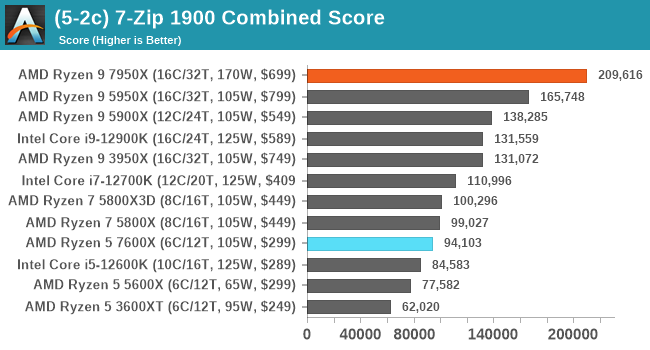
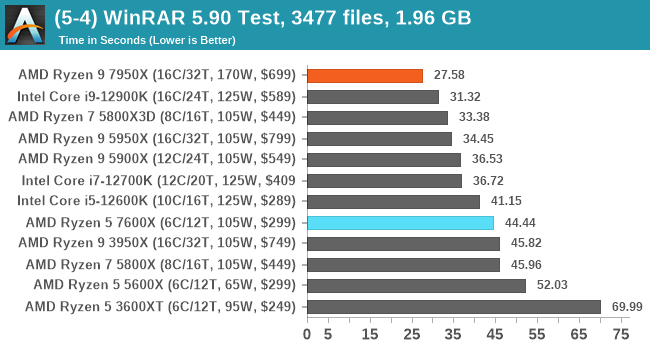
Focusing on encoding, and the Ryzen 9 7950X is the clear winner, beating the Core i9-12900K in all but one of the Handbrake tests (1080p30). The Ryzen 5 7600X trades blows with last generation Ryzen 7 5800X, which is an improvement within itself, as the Ryzen 5 5600X does lag behind the rest of the pack.










205 Comments
View All Comments
TelstarTOS - Monday, September 26, 2022 - link
Too few games tested, no 1400p tests, no 7700X tested. Waiting for more ReplyGavin Bonshor - Monday, September 26, 2022 - link
AMD only sampled us with the 7950X and 7600X. We'll hopefully get our 7700X in the near future. In regards to game testing, you'll much more/better titles in our next CPU review as we move to our 2023 suite. This will come into effect in our next CPU review. Replyrarson - Wednesday, September 28, 2022 - link
1400p? Replymeacupla - Monday, September 26, 2022 - link
What I am seeing is 5800X3D being a beastWhich is why I really look forward to 7x00X3D chips Reply
Gavin Bonshor - Monday, September 26, 2022 - link
Me too! ReplyFreckledTrout - Monday, September 26, 2022 - link
Those should be really strong. Its probably AMD's answer to Intel's 13th gen. Replykwohlt - Monday, September 26, 2022 - link
7000 3D is more so AMD's answer to MeteorLake, as both are expected sometime in 2023. Zen 4 is sometime in 2024 and will go up against ArrowLake.Vanilla 7000 and RaptorLake are direct competitors. Reply
kwohlt - Monday, September 26, 2022 - link
****Zen 5 Replynandnandnand - Monday, September 26, 2022 - link
https://www.theverge.com/23294064/intel-deny-meteo...Meteor Lake will come out in late 2023, if at all. 7000X3D sounds like it could launch in January. So 7000X3D will have free reign for the better part of a year. Reply
Lothyr - Monday, September 26, 2022 - link
Same, not to mention that it should give firmware time to stabilize, time to DDR5 to get cheaper, time for PCIe5 SSD to be released, etc. So I guess 6 months-ish before I upgrade (we'll see what Intel comes up with as well). Reply